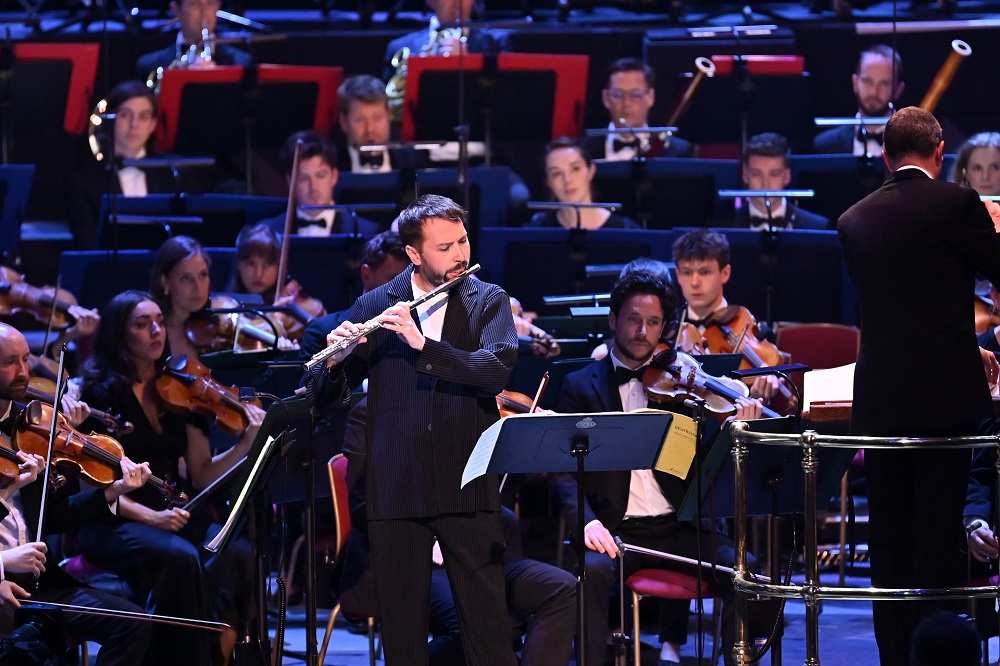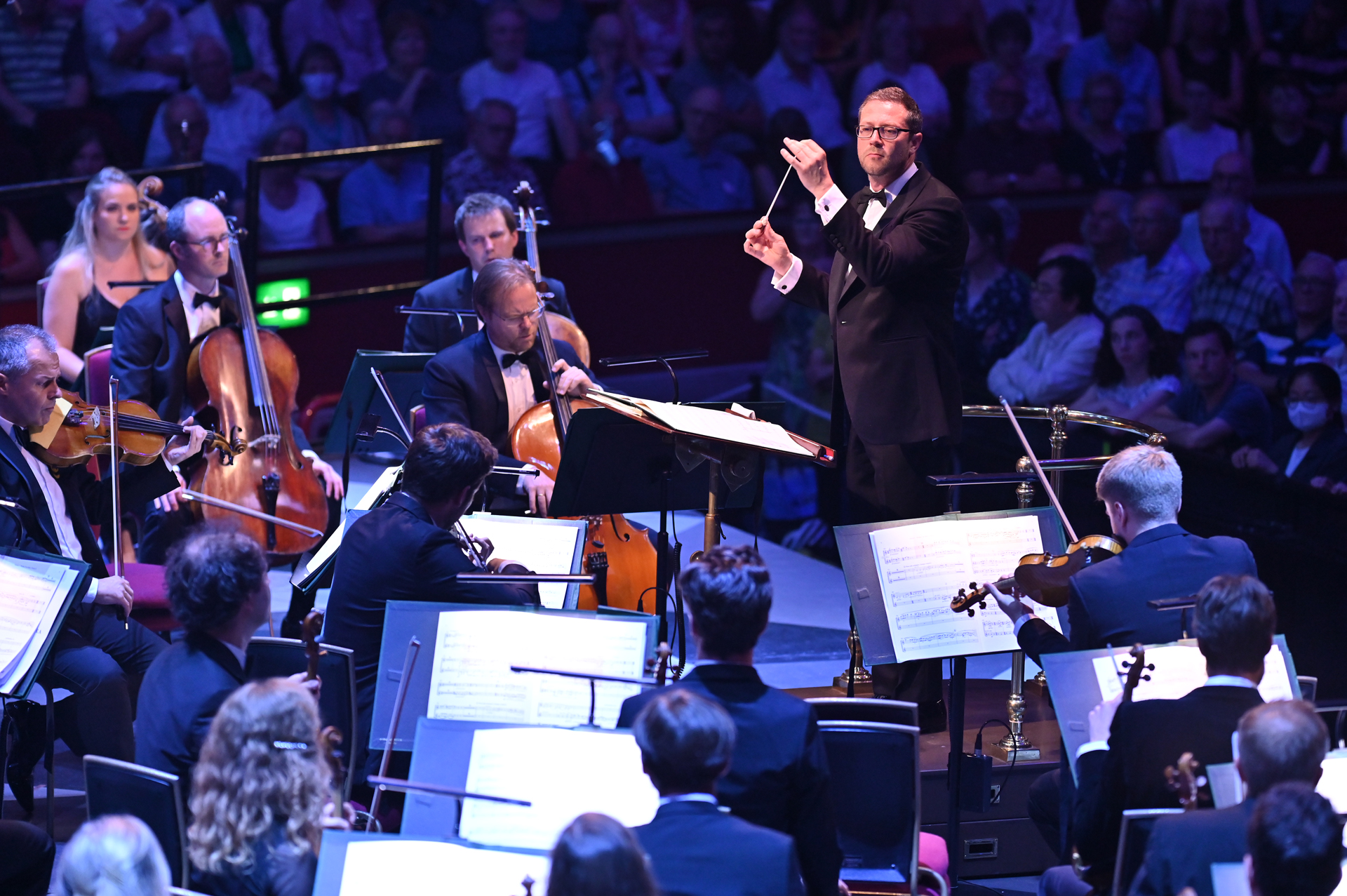Prom 2, Walker, Sinfonia of London, Wilson review - sensuousness and subtlety in excelsis | reviews, news & interviews
Prom 2, Walker, Sinfonia of London, Wilson review - sensuousness and subtlety in excelsis
Prom 2, Walker, Sinfonia of London, Wilson review - sensuousness and subtlety in excelsis
Breathtaking gamut of colours and dynamics, unique vigour from the super-orchestra
Had Claudio Abbado conducted the Berlin Philharmonic in a major Elgar orchestral work – and to my knowledge he never saw the light about the composer’s due place among the European greats – it might have sounded something like last night’s “Enigma” Variations. Yes, John Wilson and his superband Sinfonia of London really are in that league. Elgar’s cavalcade of character-studies, both inward and extrovert, is the ultimate test, the most varied of masterpieces in a various programme.
Perhaps it was a slightly over-long one. I’d have jettisoned Bax’s Tintagel in favour of a pleasing symmetry in four works, placing Walton’s dizzyingly brilliant Partita for Orchestra in the first half after Vaughan Williams’s Fantasia on a theme by Thomas Tallis, and opened the second with Huw Watkins’s Flute Concerto – not least because one of the lines with which the orchestra counters the soloist’s flurries sounds remarkably akin to Elgar's “Enigma” theme. 
Vaughan Williams’ Tallis Fantasia was a staple of the semi-lockdown months, though never, surely, with a string ensemble as big or as lustrous as this. Those five mystic chords at the start brought immediate air from another planet to an admittedly not too stuffy Albert Hall on a warm night; the ensemble lined at the very top of the platform steps, some distance from the rest, sounded first like a distant chamber organ, then an angel chorus from some celestial city. Wilson’s sure sense of rubato gave plenty of lithe muscle to fuller textures.
The same approach worked well for Tintagel, though beyond the filmic fanfare gestures, there’s not much memorable writing here – and the piece is not so neglected (Sakari Oramo included it in his very first concert with the BBC Symphony Orchestra, where it paled a little alongside Sibelius, the real thing). With Walton’s Partita, an unashamed showpiece for George Szell and the Cleveland Orchestra who gave the premiere in January 1957, individual personality leapt into action. Wilson is as taut with rhythmic energy as he is with late-romantic sweep. Walton manages a kind of concerto for orchestra within his loose homage to the Bach-era form. The outer movements are deliciously tumultuous, but the central Siciliana, more a walking-tune of which Percy Grainger would surely have approved, is the most original, starting with its duet for oboe and solo viola. 
Rhythmic precision and pure etherealism married in the “Dorabella” interlude; the pain of parting in the asterisked variation may have been so quiet that you couldn’t hear the throb of the ocean liner on the timps, but its clarinet solo was perfection. And the layering of the swagger swept away all doubts about Elgar’s more blustery side. I bet that when Wilson tackles the two great symphonies with his orchestra, they will sound incomparably wonderful. As for the encore – didn't know it, but guessed Eric Coates, and it was "At the Dance" from his Summer Days Suite – the simple but effective main waltz melody is still earworming me.
rating
Explore topics
Share this article
The future of Arts Journalism
You can stop theartsdesk.com closing!
We urgently need financing to survive. Our fundraising drive has thus far raised £49,000 but we need to reach £100,000 or we will be forced to close. Please contribute here: https://gofund.me/c3f6033d
And if you can forward this information to anyone who might assist, we’d be grateful.

Subscribe to theartsdesk.com
Thank you for continuing to read our work on theartsdesk.com. For unlimited access to every article in its entirety, including our archive of more than 15,000 pieces, we're asking for £5 per month or £40 per year. We feel it's a very good deal, and hope you do too.
To take a subscription now simply click here.
And if you're looking for that extra gift for a friend or family member, why not treat them to a theartsdesk.com gift subscription?
more Classical music
 Jansen, LSO, Pappano, Barbican review - profound and bracing emotional workouts
Great soloist, conductor and orchestra take Britten and Shostakovich to the edge
Jansen, LSO, Pappano, Barbican review - profound and bracing emotional workouts
Great soloist, conductor and orchestra take Britten and Shostakovich to the edge
 Jakub Hrůša and Friends in Concert, Royal Opera review - fleshcreep in two uneven halves
Bartók kept short, and a sprawling Dvořák choral ballad done as well as it could be
Jakub Hrůša and Friends in Concert, Royal Opera review - fleshcreep in two uneven halves
Bartók kept short, and a sprawling Dvořák choral ballad done as well as it could be
 Hadelich, BBC Philharmonic, Storgårds, Bridgewater Hall, Manchester review - youth, fate and pain
Prokofiev in the hands of a fine violinist has surely never sounded better
Hadelich, BBC Philharmonic, Storgårds, Bridgewater Hall, Manchester review - youth, fate and pain
Prokofiev in the hands of a fine violinist has surely never sounded better
 Monteverdi Choir, ORR, Heras-Casado, St Martin-in-the-Fields review - flames of joy and sorrow
First-rate soloists, choir and orchestra unite in a blazing Mozart Requiem
Monteverdi Choir, ORR, Heras-Casado, St Martin-in-the-Fields review - flames of joy and sorrow
First-rate soloists, choir and orchestra unite in a blazing Mozart Requiem
 Cho, LSO, Pappano, Barbican review - finely-focused stormy weather
Chameleonic Seong-Jin Cho is a match for the fine-tuning of the LSO’s Chief Conductor
Cho, LSO, Pappano, Barbican review - finely-focused stormy weather
Chameleonic Seong-Jin Cho is a match for the fine-tuning of the LSO’s Chief Conductor
 Classical CDs: Shrouds, silhouettes and superstition
Cello concertos, choral collections and a stunning tribute to a contemporary giant
Classical CDs: Shrouds, silhouettes and superstition
Cello concertos, choral collections and a stunning tribute to a contemporary giant
 Appl, Levickis, Wigmore Hall review - fun to the fore in cabaret and show songs
A relaxed evening of light-hearted fare, with the accordion offering unusual colours
Appl, Levickis, Wigmore Hall review - fun to the fore in cabaret and show songs
A relaxed evening of light-hearted fare, with the accordion offering unusual colours
 Lammermuir Festival 2025, Part 2 review - from the soaringly sublime to the zoologically ridiculous
Bigger than ever, and the quality remains astonishingly high
Lammermuir Festival 2025, Part 2 review - from the soaringly sublime to the zoologically ridiculous
Bigger than ever, and the quality remains astonishingly high
 BBC Proms: Ehnes, Sinfonia of London, Wilson review - aspects of love
Sensuous Ravel, and bittersweet Bernstein, on an amorous evening
BBC Proms: Ehnes, Sinfonia of London, Wilson review - aspects of love
Sensuous Ravel, and bittersweet Bernstein, on an amorous evening
 Presteigne Festival 2025 review - new music is centre stage in the Welsh Marches
Music by 30 living composers, with Eleanor Alberga topping the bill
Presteigne Festival 2025 review - new music is centre stage in the Welsh Marches
Music by 30 living composers, with Eleanor Alberga topping the bill
 Lammermuir Festival 2025 review - music with soul from the heart of East Lothian
Baroque splendour, and chamber-ensemble drama, amid history-haunted lands
Lammermuir Festival 2025 review - music with soul from the heart of East Lothian
Baroque splendour, and chamber-ensemble drama, amid history-haunted lands
 BBC Proms: Steinbacher, RPO, Petrenko / Sternath, BBCSO, Oramo review - double-bill mixed bag
Young pianist shines in Grieg but Bliss’s portentous cantata disappoints
BBC Proms: Steinbacher, RPO, Petrenko / Sternath, BBCSO, Oramo review - double-bill mixed bag
Young pianist shines in Grieg but Bliss’s portentous cantata disappoints

Add comment